Module3练习学案
Module 3 Unit 1 What are they doing? 学案(含答案).doc

Title: Module 3 Unit 1 What are they doing?Topic: In the Park.学习目标1. 学会运用句型:What are they doing? They are doing ….谈论正在发生的事情。
2. 学会认读、理解、运用单词和词组:on, in, under, doing taijiquan, rowing a dragon boat, playing chess, drinking soybean milk学习重点句型:What are they doing? They are doing ….【预习导航】一、温故知新(一)写出下面人称代词的中文意思。
(B)I you he she it we they(二)选择am, is ,are填空。
(A)1. I reading a book.2. She watching TV.3. She talking to her friend.4. It running.5. We playing football.6. They singing.7. What you doing? 8. My father taking pictures.(三)写出下面动词的现在分词。
(A)do row play drink二、新知探究(一)听录音,跟读单词3遍。
然后合上书,写出下面单词的中文意思。
(A)1. let’s2. get on3. lots of4. interesting5. thing6. look at7. people8. park9. lake 10. row11. boat 12. men 13. chess 14. drink 15. hungry(二)听录音,跟读Unit 1课文3遍,写出下面词组的中文意思。
(B)1. get on the bus2. interesting things3. in the park4. on the lake5. under the tree6. doing Taijiquan7. rowing a boat 8. playing chess 9. drinking soybean milk(三)写出下面句子的中文意思。
Module3Unit3导学案外研版英语八年级上册
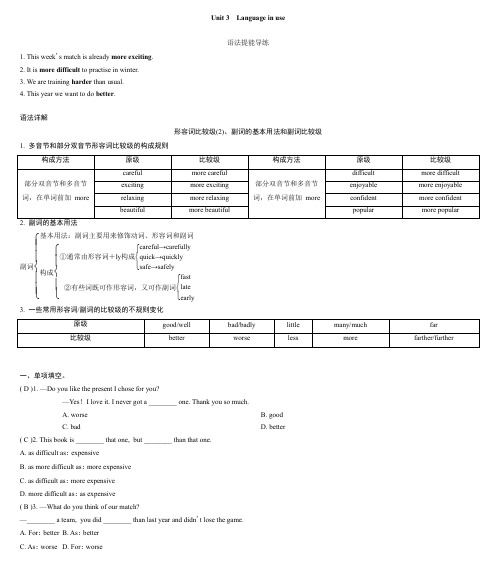
Unit 3 Language in use语法提能导练1. This week 's match is already more exciting .2. It is more difficult to practise in winter.3. We are training harder than usual.4. This year we want to do better . 语法详解形容词比较级(2)、副词的基本用法和副词比较级1. 多音节和部分双音节形容词比较级的构成规则构成方法原级 比较级 构成方法原级 比较级 部分双音节和多音节 词,在单词前加 more carefulmore careful 部分双音节和多音节 词,在单词前加 moredifficult more difficult exciting more exciting enjoyable more enjoyable relaxing more relaxing confident more confident beautifulmore beautifulpopularmore popular2. 副词的基本用法副词⎩⎪⎪⎨⎪⎪⎧基本用法:副词主要用来修饰动词、形容词和副词构成⎩⎪⎨⎪⎧①通常由形容词+ly 构成⎩⎨⎧careful→carefully quick→quicklysafe→safely ②有些词既可作形容词,又可作副词⎩⎨⎧fastlate early3. 一些常用形容词/副词的比较级的不规则变化原级 good/well bad/badly little many/much far 比较级betterworselessmorefarther/further一、单项填空。
( D )1. —Do you like the present I chose for you?—Yes !I love it. I never got a ________ one. Thank you so much. A. worse B. goodC. badD. better( C )2. This book is ________ that one , but ________ than that one. A. as difficult as ; expensiveB. as more difficult as ; more expensiveC. as difficult as ; more expensiveD. more difficult as ; as expensive ( B )3. —What do you think of our match?—________ a team , you did ________ than last year and didn 't lose the game. A. For ; better B. As ; better C. As ; worse D. For ; worse( B )4. He knows only ________ about American history and his sister knows even ________.A. little; moreB. a little; lessC. much; littleD. more; less二、完成句子。
Module3Unit3Languageinuse学案初中英语七年级上册

Module 3 Unit 3 Language in use◎课时重点:会运用there be句型的一般疑问句形式及其答语;会运用how many句型对可数名词进行提问。
【预习导学】一、填一填1.在左边2.一张我们学校的地图3.像这样4.去上学5.离开学校二、译一译1.我们班有30个学生。
______________________________________________________________2.有一张世界地图吗?______________________________________________________________3.你们班有多少学生?______________________________________________________________4.讲桌在哪里?______________________________________________________________5.全世界大部分国家的孩子在5、6岁的时候必须去上学。
______________________________________________________________三、想一想1.总结一下there be句型的肯定句、否定句、一般疑问句及答语的构成。
肯定句:否定句:一般疑问句:肯定答语:否定答语:2.There are ten desks in the classroom. 分别对句中ten和ten desks提问,问句是什么?对ten提问:对ten desks提问:【答案】一、1.on the left2.a map of our school3.like this4.go to school5.leave school二、1.There are thirty students in our class.2.Is there a map of the world?3.How many students are there in your class?4.Where is the teacher's desk?5.In most countries around the world, children must go to school when they are 5 or 6 years old.三、1.There is/are +名词+地点.There isn't/ aren't +名词+地点.Is/Are there +名词+地点?Yes, there is/are.No, there isn't/aren't.2.How many desks are there in the classroom?What's in the classroom?【合作探究】任务驱动一口语练习1.根据课本P18上1的内容,在小组里结对进行对话练习,可以根据自己学校和班级的实际情况进行回答练习,然后每组派代表进行展示。
初三初中九年级英语上册Module 3 学案活页纸打印版

Module 3 HeroesUnit 1 She trained hard, so she became a great player later.一. 单词1. including(1) including prep. 包含,包括后接名词,代词作宾语,含有补充说明之意eg. I have got three days’ holiday including New Year’s Day.(2)include v. 包含,包括eg. The price includes both book and CD.(3)included 过去分词包括...在内的放在被修饰名词或代词之后,起补充说明的作用eg. They will send you the book for $15, postage included.2.attend(1)attend v. 上学eg. Our children attend the same school.(2)attend v. 出席,参加(时间或活动,会议,婚礼,葬礼)eg. She will attend a meeting tomorrow.(3)区分join与take part in3. abroad adv. 在国外,到国外eg. I have never lived abroad before.eg. His mother often goes abroad on business. 出国eg. Chinese silk sells well at home and abroad. 在国内外4. amazing(1) amazing adj. 惊人的,极好的eg. Her success was amazing.eg. That’s really an amazing start.(2)amazed adj. 感到吃惊的eg. I was amazed at the amazing news. 对...感到吃惊5. give up 放弃➢give up sth /doing stheg. Betty isn’t good at English, but she won’t give it up.eg. He gave up smoking.➢give短语❖give away 赠送,颁发,泄露❖give back 归还❖give in 屈服,让步❖give off 发出放出(气体,热,光等)❖give out 用完,耗尽6. will n. 意志,决心,意愿eg. Children sometimes have strong wills.eg. His decision to continue shows great strength of will. eg. I don’t want to go against your will. 违背某人的意愿7. simply(1) simply adv. 的确,实在;简单地;仅仅,只eg. That would be simply wonderful!eg. The book explained grammar simply and clearly.eg. You can enjoy all the water sports, or simply lie on the beach.(2)simple adj简单的eg. This machine is very simple to use.(3) simplify v.使简化eg. The application forms have been simplified.二.课文短语1.tell sb about sth告诉某人关于...2.gold medals 金牌3.stop doing / stop to do (停下手中正在做的事)/ (停下去做另一件事)4.attend university abroad 在国外上大学5.once again 再一次plete one’s doctor’s degree 完成某人的博士学位7.give up 放弃8.anyone else 其他人9.have a strong will 有坚强的意志10.as well as 也11.make the Beijing Olympics a victory 使北京奥运会取得圆满成功12.a true hero 一个真英雄Unit 2There were few doctors, so he had to work very hard on his own. 一.单词1.sick➢the sick 病人(the+adj表示一类人),表示复数概念,作主语时谓语动词用复数形式➢sick与ill辨析(1)表示“生病的”sick表语或定语;但ill只做表语eg. He is ill / sick in hospital. 表语eg. a sick man 定语(2)ill用于名词前作定语时,表示“坏的,有害的”eg. He was unable to join the army because of ill health.2.treat(1)treat v. 医治,治疗➢treat sb for sth 因...治疗某人eg. She was treated for .(2)treat v. 对待,看待eg. Do you know why she treats you like that?3.wound(1)wound n. 伤,伤口eg. The nurse cleaned his wound.(2)wound v. 使(身体)受伤,(用武器)伤害eg. The shot wounded his arm.(3)wounded adj. 受伤的eg. a wounded soldier 一名受伤的士兵4.die for为...而死➢die for 为...而死eg. The young soldiers died for peace and freedom.➢die of 死于...eg. The old man dies of cancer.➢die词形辨析❖die v. 死亡die-died-died-dying❖death n. 死亡❖dead adj.去世的,强调“死亡”的状态❖dying adj. 垂死的,即将死亡的eg. Many people were dying.5.operation(1)operation n. 手术➢have / perform an operation on... 给...做手术eg. The doctor is having / performing an operation on the old man’s leg.(2)operate v. 做手术➢operate on 给...做手术eg. She decided to operate on the boy at once.6.continue➢continue,可接名词,代词,动名词,不定式eg. I continued the work after supper.eg. We will continue to protect these rare animals.eg. She wanted to continue working until she was 60.二、课文短语1.die for 为..而死2.take care of 照顾3.close to 靠近4.so that 以便,为了5.at that time 在那时6.on one’s own 独自一人7.manage to do 设法去做8.in the end 最后9.die of 死于... , 因..而死。
外研版(一年级起点)五年级上册英语Module 3同步学案(知识点总结+练习)
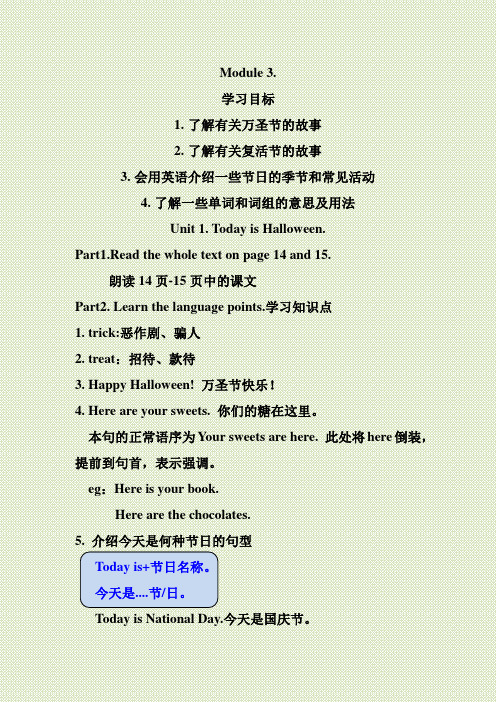
Module 3.学习目标1.了解有关万圣节的故事2.了解有关复活节的故事3.会用英语介绍一些节日的季节和常见活动4.了解一些单词和词组的意思及用法Unit 1. Today is Halloween.Part1.Read the whole text on page 14 and 15.朗读14页-15页中的课文Part2. Learn the language points.学习知识点1. trick:恶作剧、骗人2. treat:招待、款待3. Happy Halloween! 万圣节快乐!4. Here are your sweets. 你们的糖在这里。
本句的正常语序为Your sweets are here. 此处将here倒装,提前到句首,表示强调。
eg:Here is your book.Here are the chocolates.5. 介绍今天是何种节日的句型Today is+节日名称。
今天是....节/日。
Today is National Day.今天是国庆节。
Today is Mother’s Day. 今天是母亲节。
6.用主系表的结构描写节日的特点It’s a/an+形容词+festival+地点/国家。
eg:It’s an autumn festival in the UK.它在英国是一个秋天的节日。
It’s a summer festival in Yunnan.它在云南是一个夏天的节日。
7. scary:吓人的、可怕的(形容词)scared:被吓到的(形容词)eg: He is scared. 他被吓到了。
He wears scary clothes. 他穿着吓人的衣服。
8. mask:面具、面膜、面罩9. neighbour:邻居neighbourhood:街坊They visit their neighbors in the neighbourhood. 他们去拜访街坊里的邻居们。
四年级上册英语学案module3shedidn'twalktoschoolyesterday.
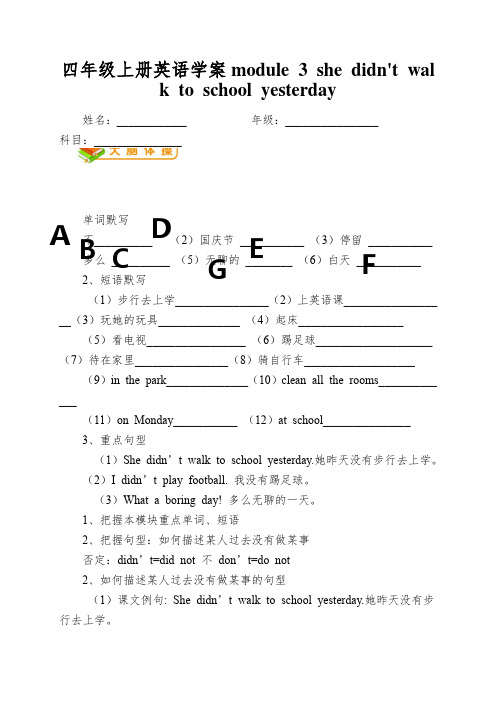
四年级上册英语学案module 3 she didn't walk to school yesterday姓名:____________ 年级:________________ 科目:_______________单词默写不__________ (2)国庆节 ___________ (3)停留 ___________ 多么 __________ (5)无聊的 ________ (6)白天 ___________2、短语默写 (1)步行去上学________________(2)上英语课__________________(3)玩她的玩具______________ (4)起床__________________(5)看电视_________________ (6)踢足球____________________(7)待在家里________________(8)骑自行车___________________(9)in the park______________(10)clean all the rooms_____________(11)on Monday___________ (12)at school_______________3、重点句型(1)She didn ’t walk to school yesterday.她昨天没有步行去上学。
(2)I didn ’t play football. 我没有踢足球。
(3)What a boring day! 多么无聊的一天。
1、把握本模块重点单词、短语2、把握句型:如何描述某人过去没有做某事否定:didn ’t=did not 不 don ’t=do not2、如何描述某人过去没有做某事的句型(1)课文例句: She didn ’t walk to school yesterday.她昨天没有步行去上学。
A B C D G E F句式结构:主语+didn’t+动词原形(+其他)(没有人称和单复数的变化)动词的过去式表达:Get--got walk--walked watch--watched stay--stayedplay--played小试手:用play football练一练She ___________________________yesterday.She didn’t _______________________yesterday.She usually______________________________.They____________________________last Sunday.They didn’t______________________last week.They always______________________________.注意:表示时刻的词yesterday/last week/last Monday/usually/always/so metimes/often3、拓展-认识各种节日Mid-Autumn Festival中秋节Children’s Day儿童节Mother’s Day 母亲节Teachers’Day 教师节拓展-时刻的表达法m上午p.m下午It’s 6:00 a.m.上午六点It’s 6:00下午六点。
高中英语(外研版)选修八 Module 3 Foreign Food学案 (1)
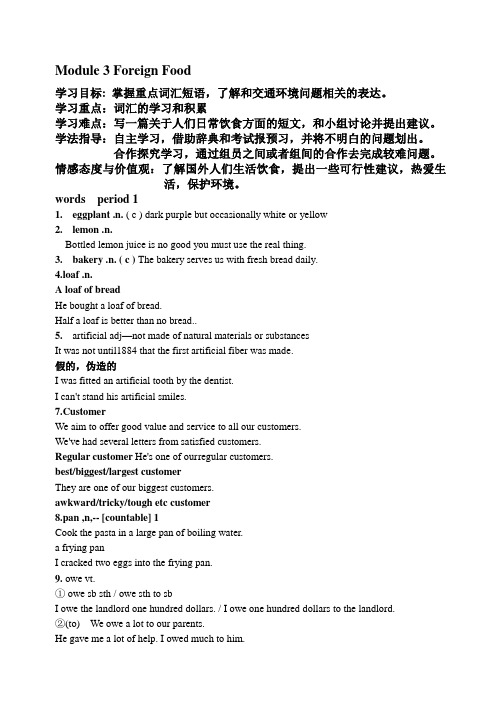
Module 3 Foreign Food学习目标: 掌握重点词汇短语,了解和交通环境问题相关的表达。
学习重点:词汇的学习和积累学习难点:写一篇关于人们日常饮食方面的短文,和小组讨论并提出建议。
学法指导:自主学习,借助辞典和考试报预习,并将不明白的问题划出。
合作探究学习,通过组员之间或者组间的合作去完成较难问题。
情感态度与价值观:了解国外人们生活饮食,提出一些可行性建议,热爱生活,保护环境。
words period 11.eggplant .n. ( c ) dark purple but occasionally white or yellow2.lemon .n.Bottled lemon juice is no good you must use the real thing.3.bakery .n. ( c ) The bakery serves us with fresh bread daily.4.loaf .n.A loaf of breadHe bought a loaf of bread.Half a loaf is better than no bread..5.artificial adj—not made of natural materials or substancesIt was not until1884 that the first artificial fiber was made.假的,伪造的I was fitted an artificial tooth by the dentist.I can't stand his artificial smiles.7.CustomerWe aim to offer good value and service to all our customers.We've had several letters from satisfied customers.Regular customer He's one of our r egular customers.best/biggest/largest customerThey are one of our biggest customers.awkward/tricky/tough etc customer8.pan ,n,--[countable] 1Cook the pasta in a large pan of boiling water.a frying panI cracked two eggs into the frying pan.9. owe vt.① owe sb sth / owe sth to sbI owe the landlord one hundred dollars. / I owe one hundred dollars to the landlord.②(to) We owe a lot to our parents.He gave me a lot of help. I owed much to him.③ [(+to)] owe sth to sth /sbHe owes his success to good luck.。
Module3Unit7Seeingafilmperiod3教案+课堂练习学案

3.能够运用所学词汇和句型进行电影话题的简单对话。
4.阅读理解:理解课文内容,提取关键信息,提高阅读能力。
课堂练习学案将围绕上述内容进行设计,通过听力、口语、阅读等多种形式,帮助学生巩固所学知识,提高实际运用能力。
核心素养目标
1.语言能力:培养学生掌握电影相关词汇,能运用一般现在时和一般过去时描述电影情节和感受,提高语言表达准确性。
鼓励学生分享学习心得和体会,增进师之间的情感交流。
(六)课堂小结(预计用时:2分钟)
简要回顾本节课学习的电影相关词汇和语法内容,强调重点和难点。
肯定学生的表现,鼓励他们继续努力。
布置作业:
根据本节课学习的内容,布置适量的课后作业,巩固学习效果。
提醒学生注意作业要求和时间安排,确保作业质量。
知识点梳理
-总结电影的主题和中心思想。
5.课堂讨论与表达:
-运用所学词汇和句型,进行电影话题的讨论。
-运用一般现在时和一般过去时,描述电影中的行为和事件。
-使用适当的连接词,使表达更加流畅,如:firstly, secondly, finally等。
6.文化意识:
-了解中西方电影文化差异,如:电影类型、表达方式等。
(2)能力方面:学生在电影话题讨论中,能够锻炼自己的听说能力,但需注意引导他们运用一般现在时和一般过去时进行描述,提高语言表达的准确性。
(3)素质方面:通过本节课的学习,有助于培养学生跨文化交际意识、批判性思维和自主学习能力,提高综合素质。
教学资源
1.硬件资源:
-投影仪
-计算机及多媒体设备
-白板及白板笔
Module 3 Unit 7 Seeing a film period 3教案+课堂练习学案
外研社初二英语Module3复习学案

Module3复习学案一.短语。
小心,留意_____________不客气_____________最新消息______________ 在那儿___________ 天气预报______________向下看_____________进了两个球(得了两分)_______________ 要……_____________关闭,停止播音____________本人,亲自__________…的声音__________ 学习关于…,了解____________ 在……岁时____________……的结果___________带某人参观某地_______离……近_______________ 二.语法1.动词不定式(to + v.)与动名词(v.-ing )作宾语A) 跟动词不定式作宾语的动词有:1. 想做某事2. 愿意做某事3.希望做某事4. 希望做某事5. 计划做某事6.需要做某事7. 决定做某事8. .同意做某事9.使某人做某事10.学习做某事B) 必须跟v.-ing形式作宾语做宾语的情况:1. 喜欢做某事2. 完成做某事3. 练习做某事4. 一直做某事C) 既可以跟动词不定式(to + v.)又可以跟v.-ing形式的词:1.停下来去做某事停止做某事2.忘了去做某事忘了做过某事3.记得去做某事记得做过某事4.努力做某事试着做某事5 .喜欢做某事6.开始做某事7.开始做某事8..继续做某事9.憎恨做某事2.词形变化:report(名词)_____________ listen(名词)___________________week(形容词)____________ invent(名词)__________________win(动名词)______________3. 同意做某事_______________同意某人的意见_____________例:你同意和我一起去面试吗?_____________________________________ 4. 反问句:形式上是一般疑问句的否定形式,翻译为“难道…吗?”答语中Yes 翻译为“不”,No翻译为“是”。
八上Module3 学案

八年级英语上Module3 Sports 学案基础知识:一.根据汉语写单词:1. 棒球________2. 排球_______3. 烦人的_________4. 令人激动的_______5. 已经_________6. 问题,麻烦______7. 怎么了?______________8. 使受伤______ ______9. 令人放松的________10. 令人愉快的_______ 11. 体育场_____ 12. 未击中_____ 13. 介意,讨厌______ 14. 打败______15. 粗心的_____16.用欢呼声激励_____ 17. 教练________18. 球迷_______ 19. 对________ 20. 训练,操练______21. 练习(n.)______ 22.使温暖_____ 23. 热身______24. 通常的______ 25. 更好的______ 26. 开心的______27. 传递______ 28. 机会______ 29. 响亮地________30. 自信的_________二.翻译短语:1.对某事确定____________2.喜欢做某事_________3.没关系______________4.介意做某事______________5.许多____________6.打败某人____________7.赢得比赛__________8.与、、、比赛_______9.呆在家里________10.为、、、加油__________ 11.尽可能早地_________12.热身_______________13.迟到____________14.在决赛中____________15.输给某人______________16.比往常____________17.像往常_____________18.有机会做某事___________三.翻译句子:1.没有什么比打网球更令人愉快。
外研社英语下册Module3语法课学案
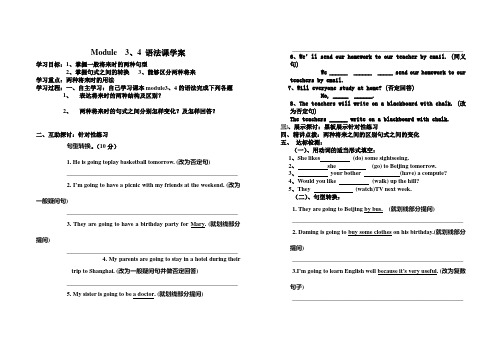
Module 3、4 语法课学案学习目标:1、掌握一般将来时的两种句型2、掌握句式之间的转换3、能够区分两种将来学习重点:两种将来时的用法学习过程:一、自主学习:自己学习课本module3、4的语法完成下列各题1、表达将来时的两种结构及区别?2、两种将来时的句式之间分别怎样变化?及怎样回答?二、互助探讨:针对性练习句型转换。
(10分)1. He is going toplay basketball tomorrow. (改为否定句)_________________________________________________________2. I’m going to have a picnic with my friends at the weekend. (改为一般疑问句)_________________________________________________________3. They are going to have a birthday party for Mary. (就划线部分提问)_________________________________________________________4. My parents are going to stay in a hotel during theirtrip to Shanghai. (改为一般疑问句并做否定回答)_________________________________________________________5. My sister is going to be a doctor. (就划线部分提问)_________________________________________________________6、We’ll send our homework to our teacher by email. (同义句)We ______ ______ _____ send our homework to our teachers by email.7、Will everyone study at home? (否定回答)No, _____ ______.8、The teachers will write on a blackboard with chalk. (改为否定句)The teachers ______ write on a blackboard with chalk.三|、展示探讨:黑板展示针对性练习四、精讲点拨:两种将来之间的区别句式之间的变化五、达标检测:(一)、用动词的适当形式填空:1、She likes (do) some sightseeing.2、she (go) to Beijing tomorrow.3、your bother (have) a compute?4、W ould you like (walk) up the hill?5、They (watch)TV next week.(二)、句型转换:1. They are going to Beijing by bus. (就划线部分提问)_________________________________________________________2. Daming is going to buy some clothes on his birthday.(就划线部分提问)_________________________________________________________3.I’m going to learn English well because it’s very useful. (改为复数句子)_________________________________________________________4. Meimei helps her mother do some cooking. (改为一般将来时)_________________________________________________________5. I’m going to visit my grandma at the weekend. (就划线部分提问)_________________________________________________________6、I think that everyone will use computers. (否定句)I _______ ______ that everyone _____ ______ computers.7、Everyone will use paper , pens and pencils. (用now 改为现在进行时)Everyone _____ ______ paper , pens and pencils.六、拓展提升:写一下你本周末的计划。
Book 6 Module 3 学案

Book 6 Module 3 Interpersonal Relationships--FriendshipThe First Period WordsTeaching Aims(教学目标):To grasp the usages of the new words in this module.Teaching focuses and difficulties(教学重点及难点):burst, confront, regret, 以及knock,turn, touch, forgive, in return的相关短语及用法。
Teaching Aids (教具): A tape recorder,PPT and study paper(学案). Teaching methods:Asking and answering activity.Teaching content (教学内容):1.burst out doing 突然发生…;突然做…起来突然大笑/大哭起来=burst into vt 突然(进入某种状态或发生某种情况)burst in vi 闯进来;突然插嘴;打断谈话;突然到来burst into blossom 开花Exercises●The police________ (闯入)and arrested the thief.●Hearing the sad news, he ________(大哭起来).●How dare you ______(闯入) on/upon us without a knocking?●The aircraft crashed and__________(起火).2.knock有关短语:1)knock sb/ sth over = knock over sb/ sth(开车)撞伤、撞死sb/ sh; 打翻、弄翻knock sb down; knock down sb 撞到2) knock at/ on…敲(门、窗等)3) knock… against…以……碰撞;碰撞4) knock/ hit sb on the head 打某人的头5) knock into sb 偶遇sb6) knock… into…把……敲入……7) knock … out (of) 把……(从……)敲出8) knock off 砍价;停止Exercise:填入正确的时态、结构(knock的相关短语)1)I / the door, but there was no answer.2)He his leg the desk.3)I went shopping yesterday and one of myacquaintances.4)Mr. White a nail the wall just now.5)Tom and Bob quarreled a lot,with .(Bob打了Tom 的头)6)If the bottle is , Mr. Brown will think that anearthquake is coming.7) A child / by a car when crossing theroad.8)They 10﹪the price and I bought it.9)Let’s work and have a cup of tea.3.turn round 转过身来turn up 拧大(声音、开关等);出现、露面turn down 关小,调低;拒绝turn out (to be) (不用被动)后来结果是……;证明是……生产;培养It turned out that…后来证实……turn against 背叛turn to sb for help 向Sb要求帮助turn in 上交turn away 赶走;辞退Exercise:1)As the stadium was full, they .2)The rumor(谣言) true.3)It that two travelers had been killed.4)your composition in time, please.5)We had thought the weather would be bad but it finethat day.6)The hero said, “Nothing could make me mymotherland.”7)The factory can 1000 cars a day.8)Though there were many differences between American and Chineseeducation system, both can excellent graduates.9)It’s getting dark. I don’t want to go any further. Let’sand go home.4.confront v. 面对(危险、困难)confront sb with … = face sb with… / sb be confronted/ faced with …使sb 面对……e.g. I have . 我面临一个新问题。
高中英语Module 3 My First Ride on a Train学案
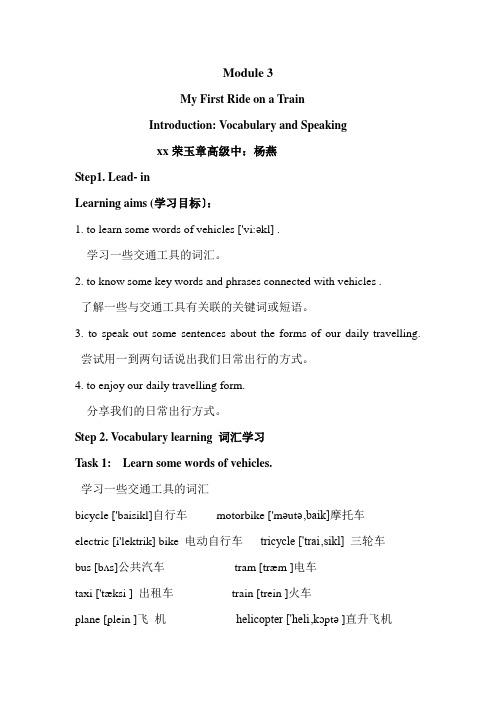
Module 3My First Ride on a TrainIntroduction: Vocabulary and Speakingxx荣玉章高级中:杨燕Step1. Lead- inLearning aims (学习目标〕:1. to learn some words of vehicles ['vi:əkl] .学习一些交通工具的词汇。
2. to know some key words and phrases connected with vehicles .了解一些与交通工具有关联的关键词或短语。
3. to speak out some sentences about the forms of our daily travelling. 尝试用一到两句话说出我们日常出行的方式。
4. to enjoy our daily travelling form.分享我们的日常出行方式。
Step 2. Vocabulary learning 词汇学习Task 1: Learn some words of vehicles.学习一些交通工具的词汇bicycle ['baisikl]自行车motorbike ['məutə‚baik]摩托车electric [i'lektrik] bike 电动自行车tricycle ['trai‚sikl] 三轮车bus [bʌs]公共汽车tram [træm ]电车taxi ['tæksi ] 出租车train [trein ]火车plane [plein ]飞机helicopter ['heli‚kɔptə ]直升飞机ferry ['feri] 游船ship [ʃip]轮船Task 2: Match the words with the pictures.把词汇和图片配对Turn to page 21,and finish the task.Task 3 : Answer the questions using the given words in the box. (用所给词汇答复以下问题)1: Which of the vehicles in the box travel on roads?2: Which of them travels on rails?3: Which of them travel on water?4: Which of them travel in the air?Step 3 : Language points 语言学习点Task 4: to learn some key words and phrases1.get on / get off 上\下〔车、船、飞机等〕2.get into / get out of 上\下〔出租车、小汽车等〕3. ride [raid] 骑〔自行车〕4. drive[draiv] 驾驶〔小汽车等〕5. by [bai]乘坐,使用6. on foot /walk [wɔ:k]步行Task 5: Translation 翻译1. 上火车2. 下飞机3. 上出租车4. get out of the car5. ride a motorbike6.驾驶小汽车7. by bus 8. 步行Step 4. Summary and evaluation总结与评价1.In the class, we have learnt the new words: helicopter, motorbike, tram and so on.2. We have known the key words and phrases: get on/ off, get into/ out of, ride, drive, by, on foot / walk.3. We have enjoyed each other's daily travelling forms.Homework:课后作业Fill in the blanks with the given words and phrases .get on, get off, get into, get out of,drives, by, on foot, rode,1. I _______ the bus from my home and ________ at the schoolbus station every day.2 . I _____ the bicycle down town to visit my friends last weekend.3 . I usually go to school ____________.4 . He ______________ his car to see what happened at the crossroad.5 . He _______ to work every day.6 . My parents often go to work ____ car.7. I got up late this morning and had to _________ a taxi to my office.。
Module 3 Jourey to space 复习学案

Module 3 Journey to space 复习学案------------- 台头一中侯凤芹教学目标(Teaching Aims)1.知识目标Words about spaceDrills: Have you arrived yet?----Yes ,I have \No ,I haven’t.Grammar: The Present Perfect Tense2、能力目标: 通过对单词、句型和语法的有效处理,培养学生综合运用本单元知识的能力。
3、情感目标:通过对本模块话题的讨论,和对句型在实际生活中的应用,培养学生对科技技术的兴趣和热爱之情。
重点:Words about experienceThe Present Perfect Tense难点:Learn to use the Present Perfect Tense课前朗读:earth , already , just , model , space station , panic , latest , several , discover , recently , space shuttle , show over , planet , also , none , environment , air , grow , part , billion, universe , light , beyond , alone , cost , prefer( preferred , preferred) , diary , even, secret ,real , twice, explore教学过程:自主复习:Step 1 独学感悟1.自己结合教材、笔记复习等Module 3,复习短语,重点句式并将重点内容记录下来(独学)。
2.跟踪检查(部分学生到黑板前展示,部分在作业本上展示)3、复习现在完成时态完成下面内容(两两对学)①现在完成时态的结构:②写出下列动词的过去分词:arrive__________take ________eat ________ send________find _______make _______go ___break______write_______get ________bring_______③用完成时完成下列句子。
Module3Unit3学案英语七年级上册

Module 3My schoolUnit 3Language in use学习目标1.复习巩固本模块所学单词、短语和句型。
2.练习巩固there be句型和方位介词(短语)的用法。
3.介绍一下自己的学校。
自主学习学习任务一:根据音标写出对应的英语单词和汉语意思/kəmˈpjuːtə//ˈfɜːnɪtʃə//ˈpɪktʃə/ /ˈθɜːti//ˈfɪfti/ /ˈeɪti//ˈnaɪnti/ /ˈrɪəli//ˈbɪldɪŋ/ /ˈlaɪbrəri/学习任务二:预习活动2看图片,完成短文。
This is a map of our school.(1)the gate is the office building and behind this is the (2).(3)the classroom building is the library. The science building is (4)the dining hall and the(5). And behind the dining hall, the playground and the library there are(6).学习任务三:复习有关学校设施的名词,完成词汇图。
学习任务四:预习Around the world读Around the world中的短文,回答下面的问题。
(1)When must children in most countries around the world go to school?(2)When do the children in the UK go to primary school?(3)When do they go to secondary school?合作探究there be 句型there be句型表示“某处有……”,它表示的不是某人“所有”,而是某地“存在”。
其构成是:肯定句:There is +可数名词数/可数名词…There are +可数名词复数…There an old man near the gate.门口附近有一位老人。
- 1、下载文档前请自行甄别文档内容的完整性,平台不提供额外的编辑、内容补充、找答案等附加服务。
- 2、"仅部分预览"的文档,不可在线预览部分如存在完整性等问题,可反馈申请退款(可完整预览的文档不适用该条件!)。
- 3、如文档侵犯您的权益,请联系客服反馈,我们会尽快为您处理(人工客服工作时间:9:00-18:30)。
复习检测一、单词拼写根据下面各题括号里汉语和首字母提示和句子的意思,写出英语单词的恰当形式1. We were _____ (打败)last time.2. They will be _______(允许)to watch the match tonight .3. They’ve got no __________(机会)to win this match .4. Liu Xiang is a ___________(代表)of China’s international sporting success.5. Yao Ming is not an _______(突如其来的)success .6. Will Liu Xiang be ______(鼓励)to spend more time awayfrom sport ?7. I think it will be a ________(艰苦的)match .8. Sun Haiping is Liu Xiang’s _________(教练).9. We hope Liu Xiang will go for more ______(奖牌)forChina in the future .10. Many sports stars appear in _______(广告)and films .11 We lost the game, we were d_____ by No. 1MiddleSchool.12 We will play a _____a team from Shanghai in next season.13 My teacher often e_____us to study hard for the future.14 The final s is 4:3. Our team has won thegame.15We need one more p to win the game. 16H always live in people's heart.17I was i to dinner at my classmate's home last Sunday.二、短语:1一个体育英雄______ 2、一个金牌获得者3、体校____________4、继续赢奖牌5、首先__________6、世界体坛(育)的成功7、既然,由于___________ 8、确信,保证9、有规律地训练____________ 10、建立11、和、、、相比____________ 12、被和、、、相比13、110米跨栏比赛_______________ 14、在同一年15、亚运会______________________ 16、一夜成名17、鼓励某人干某事________________ 18、追求19、在、、、方面的能力__________ 20、著名的、出名的三、语言点练习:1、首先,我要感谢各位的光临,_____ _____ _____, I want to thank everyone for coming .2、去年他们建立了两项体育项目They____ _____two programmes on sports last year.3、他在跨栏方面的天赋被教练孙海平注意到了。
His_____ _____hurdling was noticed by his coach Sun Haiping.四、单选1 —I don’t allow __________ only in my bedroom.—But I don’t allow my family __________ anywhere.A. smoking, smokingB. to smoke, smokingC. smoking, to smoke2 He __________ me at chess yesterday.A. defeatedB. wonC. was beaten3 His parents often encourage him ___________ hard.A. workB. workingC. to work4 The Olympic Rings _________ the five parts of the world.A. are stand forB. are stood forC. stand for5 ________ I was nervous, but soon I started to relax.A. First of allB. At firstC. After all6 She is mad _________ me for telling lies.A. withB. aboutC. to7 —Maybe the news won’t worry her. __________________—I think so.A. What’s up ?B. What do you reckon?C. Really?8 More than two schools ___________ in the city next year.A. are builtB. will buildC. will be builtD. was built9. —The recorder _________ yesterday, It works now.— Thank you very much.A. repairedB. was repairedC. will be repaired10 People say the subway _____ building in Harbin in a fewyears.A. will finishB. is finishedC. will be finished11. —I will have a trip to Mount Huang if my best friend Amy_____ , too.— You mean you will go if Amy goes.A. will inviteB. invitesC. is invitedD. will be invited12.—I usually have milk and bread for breakfast.— ____________________.A. so have IB. So I doC. So do I五、填空Liu Xiang—Trained for GoldSports Yearbook 2004For Liu Xiang, life as a hero has just begun. First of all, he'll be invited to around the world. He'll be chosen to China at theOlympic Games. He's a of China's international sporting success.And now that he's well known all over the world, Liu Xiang will also be asked to appear inand films, and even to record music. But his coach Sun Haiping is making sure that he trains . Liu Xiang will be advised by his coach on how to be a great sportsman, and by his manager on how to be a star.Liu Xiang is not an overnight success. He was born in Shanghai on 13th July, 1983 and, like many Olympic stars, he started training when he was very young. In Grade Four, he went to the Junior Sports School of Putuo District of Shanghai. Liu was encouraged at first to traina high jumper. Then, in 1998, his skill at hurdling was noticed by his coach Sun Haiping.Liu Xiang was helped by a special programme. It was set up in 2001 to help young sportsmen and sportswomen. Liu's races were recorded, and his performance was compared with the world's best sports stars. Sun Haiping used the information tochange Liu's training programme. In 2002 he won his first international 110m hurdles event in Switzerland, and in the same year, a gold medal at the Asian Games in Korea. In 2004, Liu won the first Olympic gold medal in the same event for China in Athens, Greece.So what's next for Liu Xiang? Has he found out that there's more to life than training? Will he be encouraged to spend more time away from sport? No, Liu Xiang will go for more medals for China because !六、Complete the time with the notes.∙1983 ∙1993 ∙1998 2001∙2002 ∙2004 ∙future plans a.w on an Olympic gold medal in Athensb.h urdling skill noticedc.training programme changedd.a ppear in films, advertisements and record musice.b orn in Shanghaif.won in Switzerland and Koreag.started training at a sports schoolComplete the time with the notes.∙1983 e∙1993 g∙1998 b∙2001 c∙2002 f∙2004 a∙future plans d a.won an Olympic gold medal in Athensb.hurdling skill noticedc.training programme changedd.appear in films, advertisements and record musice.born in Shanghaif.won in Switzerland and Koreag .started training at a sportsschool七、Rewrite the following notes in full sentences.a.won an Olympic gold medal in Athensb.hurdling skill noticedc.t raining programme changedd.appear in films, advertisements and record musice.born in Shanghaif.won in Switzerland and Koreag.started training at a sports schoolLiu Xiang was born in Shanghai in 1983.Answers:1.He won an Olympic gold medal in Athens.2.His hurdling skill was noticed.3.The training programme was changed.4.He will be asked to appear in films, advertisements andrecord songs.5.He was born in Shanghai.6.He won races in Switzerland and Korea.7.He started training at a sports school.八、Now write sentences about Zhang Yining's training.∙Coach Wang Bilin noticed Zhang Yining.∙Zhang Yining ...∙Wang Bilin asked Zhang Yining to go to Shichahai Sports School.∙Zhang Yining ...∙Zhang Yining's training programme took up a lot of her time.∙ A lot of Zhang Yining's time ...∙Zhang Yining's mother advised her to study hard as well as train hard.∙Zhang Yining ...∙(改为主动语态)1、Liu Xiang will be advised by his coach on how to be a great sportsman2、In 1998, his skill at hurdling was noticed by his coach Sun Haiping.3、Liu Xiang was helped by a special programme.(改为被动语态)Sun Haiping used the information to change Liu's training programme.九、Join the sentences above to write a paragraph aboutZhang Yining. Use and, although and because.Model answer:Zhang Yining was asked to go to Shichahai Sports School because she was noticed by Coach Wang Bilin. Although a lotof her time was taken up by her training programme, Zhang Yining was advised by her mother to study as hard as train.。
